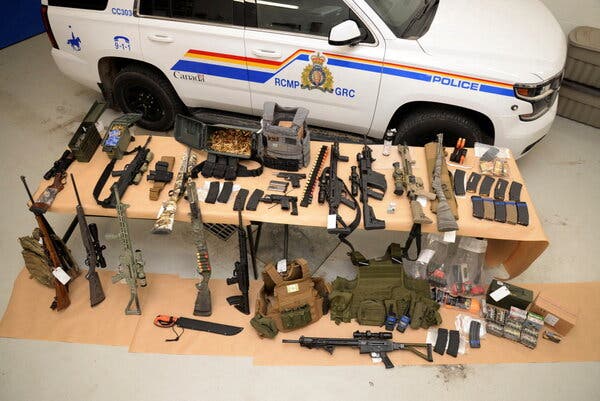Four protesters in Alberta have been charged with conspiracy to murder, police said, in relation to a plan to use violence if police officers tried to break up a blockade in Coutts, a village in southern Alberta bordering Montana.
A stockpile of weapons was discovered by the police in trailers in Alberta on Monday. Police said a small protest cell in the province had been prepared to use force to maintain the now disbanded blockade in Coutts, which began more than two weeks ago at a border crossing there.
Thirteen people were arrested, ranging in age from 18 to 62, the Royal Canadian Mounted Police in Alberta said in a statement on Tuesday. In addition to charging four with conspiracy to commit murder, the police charged most of the remaining protesters with possession of a weapon and with “mischief” over 5,000 Canadian dollars.
Police officials said that in the early hours of Monday, they had searched three trailers linked to a criminal organization connected to the Coutts protests and seized weapons, including 13 long guns, handguns, a machete, multiple sets of body armor, a large quantity of ammunition and magazines.
Traffic began flowing again at the Coutts border crossing early Tuesday morning, after protesters began leaving the site, following the arrests.
In an example of the militant mind-set of a small segment of the Coutts protest, the police said that on Sunday evening a large farm tractor and a semi truck, both involved in the blockade, had attempted to ram a police vehicle. They said the driver had been identified and “taken into custody.”
As the protests roiling the country near the three-week point, Canadians woke up Wednesday with the hope that the blockades disturbing daily life and undermining the economy may be starting to gradually dissipate.
This week, Prime Minister Justin Trudeau made his most aggressive move yet, declaring a national emergency aimed at ending the blockades that have paralyzed the center of the Canadian capital and reverberated across the country. It was the first time in more than a half-century that a Canadian government had taken such a drastic step.
The patience of many Canadians has grown thinner with each passing day as the nation’s image of serenity and order has given way to scenes of truckers shouting “freedom,” honking horns, confronting police, and, in some cases, taunting fellow citizens who wear masks.
In a sign of that impatience, Ottawa’s chief of police, Peter Sloly, resigned on Tuesday amid criticism that the police and Mr. Trudeau’s government have been ineffectual and sluggish in stemming the disruptions.
Under the extraordinary measures invoked by Mr. Trudeau, police forces across the country have the power to seize trucks and other vehicles being used in blockades. The measure formally bans demonstrations that “go beyond lawful protest,” and allows governments to ban blockades in areas like border crossings, airports and the city of Ottawa.
While trucks continue to snarl traffic and disrupt daily life in Ottawa, there are signs that the protests and blockades appear to be slowly diminishing, though at a far more glacial pace than many Ottawa residents would like. The Ottawa police said on Tuesday afternoon that the number of trucks in the downtown core had shrunk to 360 vehicles compared to more than 400 vehicles earlier in the week while about 150 protesters remained on the streets.
Deputy Chief Patricia Ferguson said that police had so far opened 172 criminal investigations related to the protests, charged 33 people, and issued 3,000 tickets.
Protests and blockades have extended well beyond Ottawa, among them an almost weeklong blockade of the Ambassador Bridge connecting Windsor, Ontario, and Detroit. Traffic began making its way over the bridge, a vital supply route for the automobile industry, early on Monday.
For some, Mr. Trudeau’s extraordinary response brought back memories of October 1970 and a tumultuous period known as the October Crisis. Prime Minister Pierre Elliott Trudeau — Justin Trudeau’s father — quashed a wave of terrorism by a violent Quebec separatist group by invoking the War Measures Act, and sending in troops to Montreal.
It was the only time in Canadian history that the war act was applied in peacetime. The Emergencies Act was introduced in July 1988 to replace the war act.
But Justin Trudeau has repeatedly stressed that he won’t call in the military to defuse the protests, and that he won’t use measures to breach fundamental civil rights.
“This is not a peaceful protest,” Mr. Trudeau said this week. “The time to go home is now.”


























